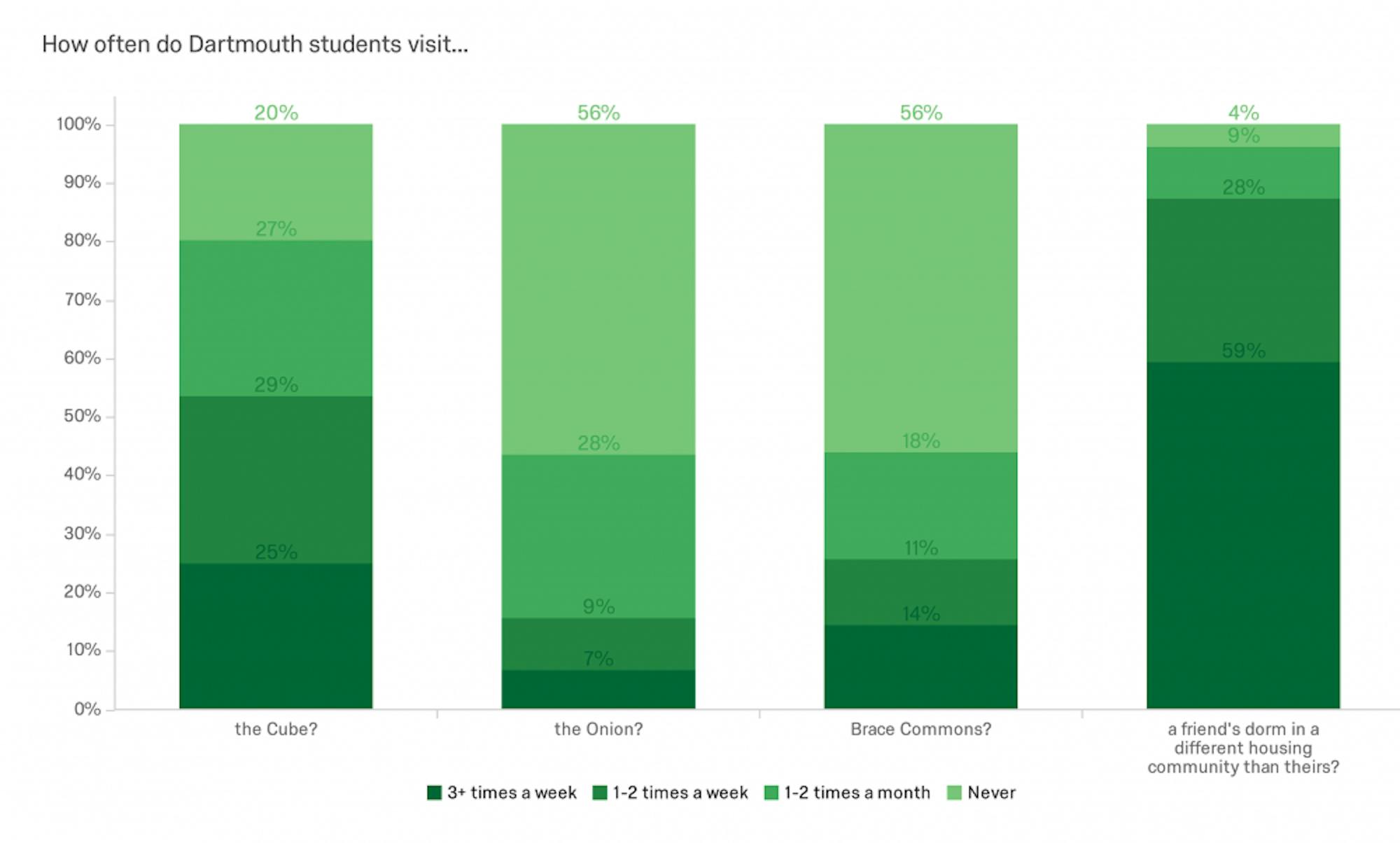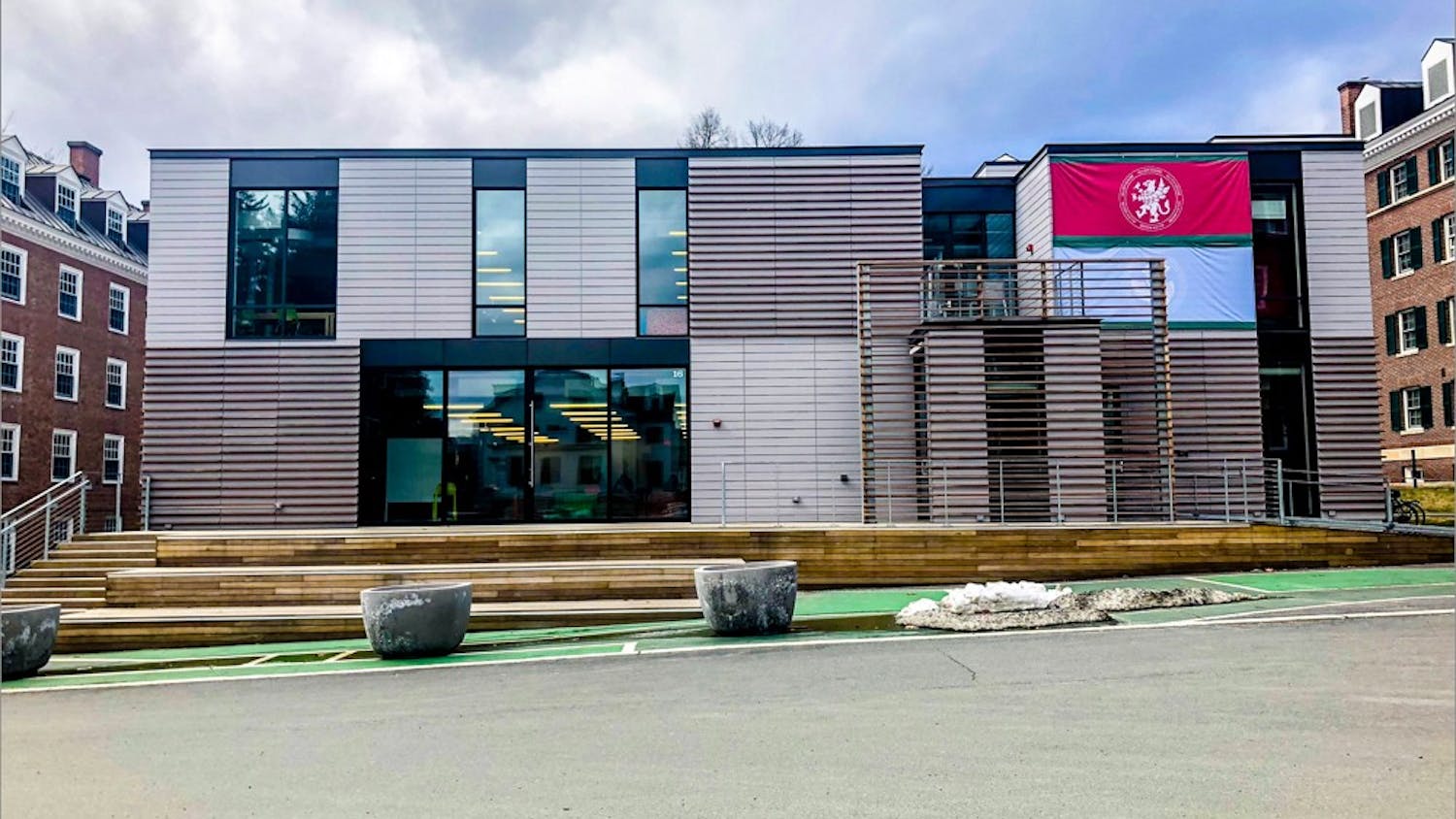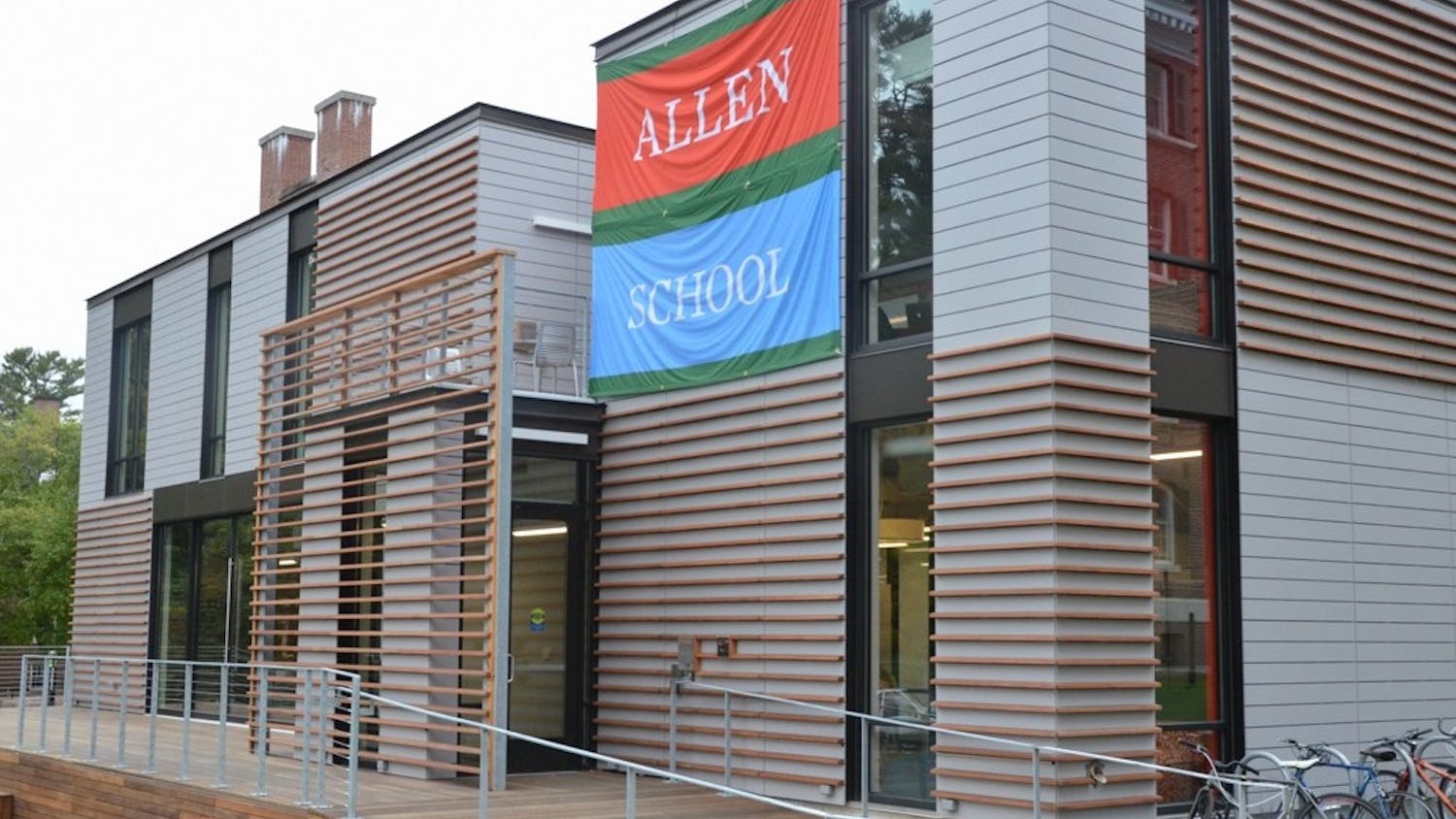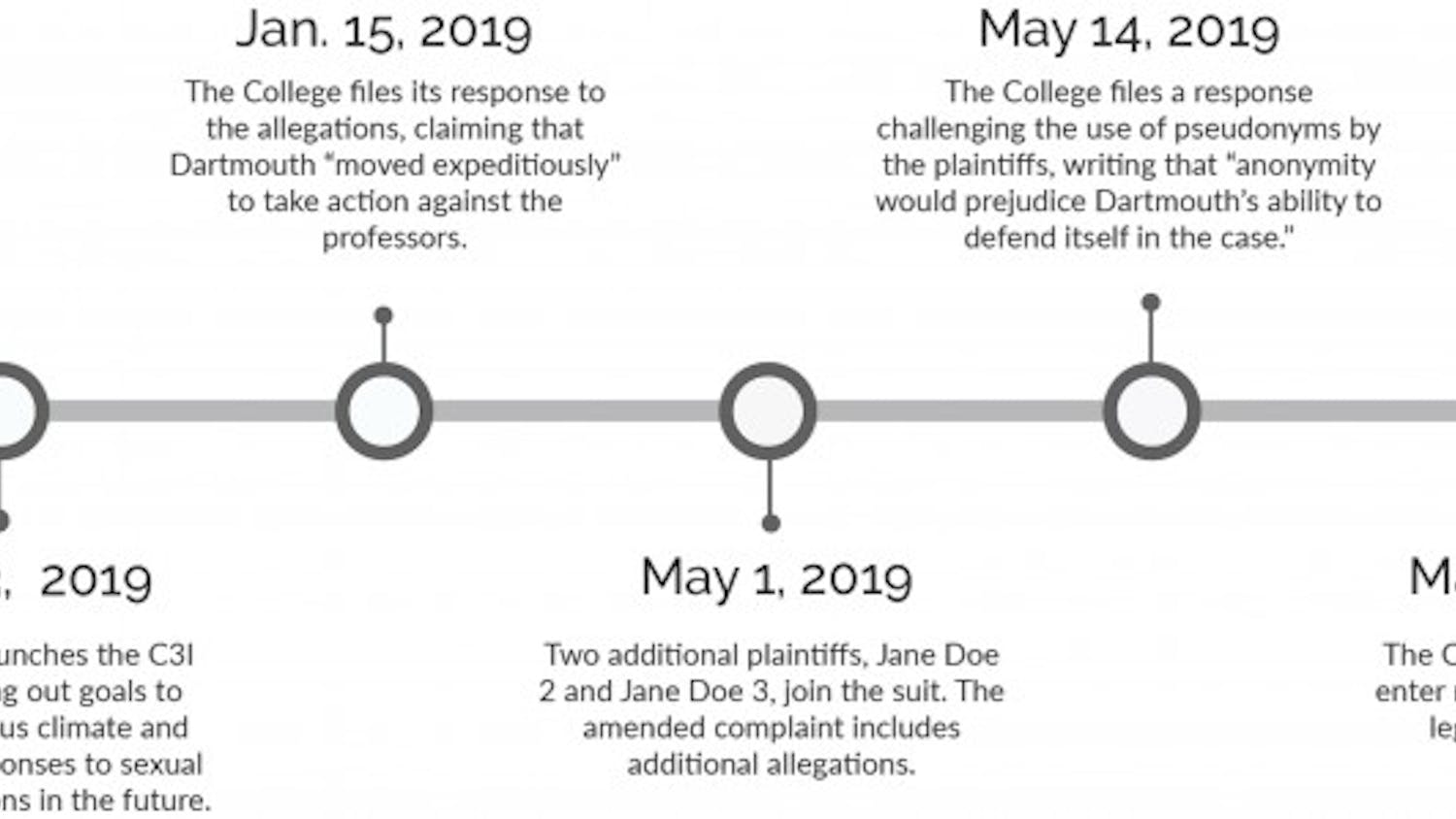As students arrived on campus this fall, they were greeted by several changes impacting the College. These included the new restrictions on dorm and house center access, the settlement of the sexual misconduct class action lawsuit against the College and the implementation of the new Chosen Name and Identity initiative. Earlier this term, The Dartmouth surveyed the student body on their opinions regarding these three topics. The following article presents some of the results.
Students firmly oppose new housing changes
The new housing restrictions, which prevent students from accessing dorms or house centers outside of their own House, are very unpopular with the student body. Overall, around 80 percent of students strongly oppose the changes and an additional 14 percent somewhat oppose them. Compared to upperclassmen, members of the Class of 2023 feel less strongly about the new changes: Only 68 percent of ’23s strongly oppose the changes, compared to 80 percent or more for each of the remaining classes. The percentage of ’23s that only somewhat oppose the housing restrictions is correspondingly higher at 24 percent.

First-year students were less likely to oppose the new housing policies.
The explanations given by the College for the dorm access restrictions have included: (1) improving security across campus, especially with regard to the racial bias incidents that occurred last fall; and (2) deepening student commitment to the House system. Overall, students have not bought the first argument: 96 percent of students do not feel safer with the new changes, and some students even expressed concerns that these changes actually may have made campus less safe. Moreover, students generally doubt that the changes will adequately address the racial bias incidents that they were designed for: 88 percent of students strongly doubt that the changes will address racism on campus, and a further eight percent somewhat doubt this claim.
Students express a little less negativity regarding the second argument. The majority — 64 percent strongly, and an additional 20 percent somewhat — disagree that housing restrictions will promote greater community within individual Houses. However, many students also expressed concerns that the changes may simultaneously harm the Dartmouth community as a whole: 79 percent of students strongly or somewhat agree that the restrictions will harm inter-House relationships. Students indicated that they visit the dorms of friends in other Houses very often: 59 percent of all students visit three or more times a week, while 28 percent visit at least once a week.
Overall, the College’s handling of the housing situation has left many students unsatisfied. Over half (55 percent) of students indicated that the dorm and house center restrictions have had a strongly negative impact on their view of the College’s administration, while a further 36 percent said that the changes had a somewhat negative impact.
The Cube remains popular with students of all Houses
One common complaint regarding the new dorm access changes is the restriction of access to the house centers based on House affiliation. House Center B (colloquially referred to as “the Cube”), though designed for Allen and School Houses, proves popular among members of the other four Houses as well. Most East Wheelock and West House students — 53 percent and 58 percent, respectively — report visiting the Cube at least once a week, along with 43 percent of North Park students and 35 percent of South House students. Twenty percent of East Wheelock, 20 percent of North Park, 32 percent of South House and 21 percent of West House students report having never visited the Cube, including ’23s. Considering only upperclassmen further reduces these figures to 11 percent (East Wheelock), nine percent (North Park), 22 percent (South House), and seven percent (West House).
House Center A (colloquially referred to as “the Onion”) is far less popular than the Cube with students of all houses, including the North Park and South Houses that it is meant to serve.
Though not a house center, a similar living space and snack bar in Brace Commons is designated for East Wheelock students. While Brace is highly utilized by East Wheelock students — 84 percent report visiting the space weekly — it enjoys some popularity with other houses as well. Still, with a majority (56 percent) of the student body reporting having never visited the Onion and a similar amount (also 56 percent) for Brace, the Cube remains the most popular space.
Access to the Cube seems to be a major factor affecting students’ views on the new policy. Ninety-four percent of students who visit the Cube three or more times a week and 91 percent of students who visit at least once a week also strongly oppose the access restrictions overall; only 71 percent of students who visit the Cube infrequently and 61 percent of students who have never visited strongly oppose the changes.
Students show mixed feelings on sexual misconduct settlement
The sexual misconduct class action against the College — which alleged that the College had known about the behavior of former psychological and brain sciences PBS professors Todd Heatherton, Bill Kelley and Paul Whalen, but failed to take action — was recently settled. Though the College has maintained that it did not commit wrongdoing and expressly denied that it broke any law or statute, the majority of students do not agree: 72 percent of the student body believe that Dartmouth is liable, while the remaining 28 percent believe it is not.
However, students hold mixed feelings about the settlement between Dartmouth and the plaintiffs. Overall, 26 percent of students feel very or somewhat satisfied with the settlement, and 23 percent of students feel very or somewhat dissatisfied. Indeed, students generally do not feel strongly either way about this topic: only five percent of students feel very satisfied, and six percent of students feel very unsatisfied. On the other hand, 51 percent of students feel neither satisfied nor dissatisfied with the settlement.
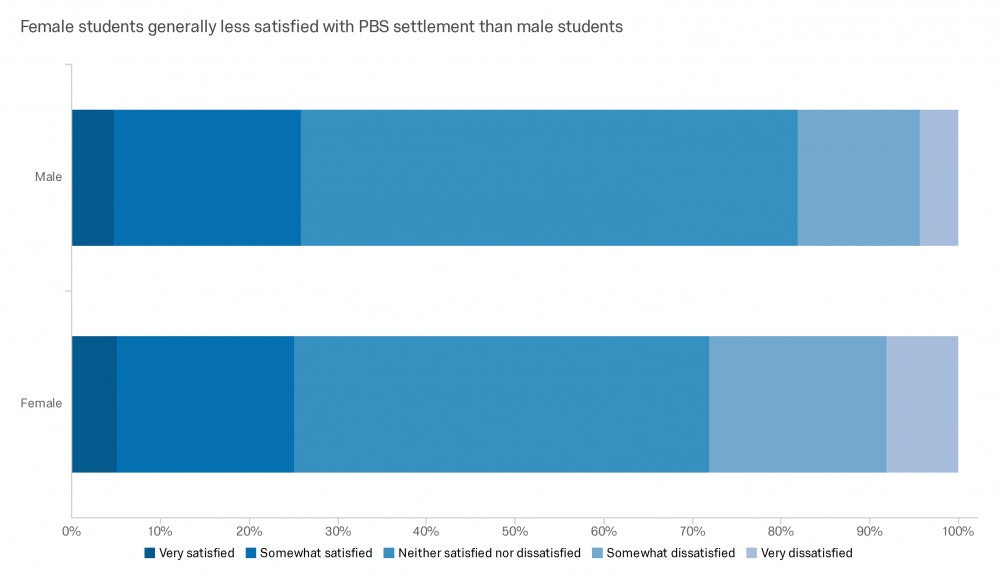
Around one-quarter of students said they were satisfied with the recent sexual misconduct lawsuit settlement.
The College’s attempts to prevent similar situations from occurring again in the future — most notably the Campus Climate and Culture Initiative — are viewed slightly more negatively. Twenty percent of students indicated that Dartmouth has been successful in limiting the power imbalances that allowed the PBS professors’ misconduct to occur, while 37 percent of students believe the College has been unsuccessful in this regard. Again, however, the majority of students do not hold strong opinions on this topic; 43 percent of students replied that the College has neither been successful nor unsuccessful with these initiatives.
Chosen Name and Identity initiative received warmly by students
One change that has been received positively is the College’s new Chosen Name and Identity initiative, which allows students to change their preferred names, pronouns and gender identity on Darthub. Sixty-three percent of respondents strongly supported the new initiative, with a further 13 percent of respondents somewhat supporting the policy. A small part of the student body already plans to use the feature: seven percent of students plan on updating their chosen names, six percent of students plan on updating their pronouns and four percent of students plan on updating their gender identities. One potential setback for the policy, however, is that it has arrived with little fanfare: 46 percent of respondents indicated that the College has not adequately explained the new initiative and the process of changing pronouns and preferred names.
Methodology Notes:
From Sept. 23 to Oct. 5, The Dartmouth conducted an online survey of the Dartmouth student body on their opinions of Dartmouth-related events. The survey was sent out to 4,517 emails through the CAMPUS-EVENTS listserv. Six hundred and sixty-five responses were recorded, resulting in a 14.7 percent response rate. Using administrative data from the College’s Office of Institutional Research, responses were weighted by class year, gender and race/ethnicity. Weighting was accomplished through iterative proportional fitting (raking). Survey results have a margin of error of +/- 3.5 percentage points.

